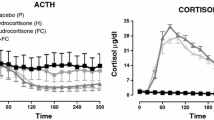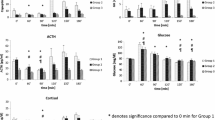Abstract
GH releasing peptide (GHRP-6) is a synthetic hexapeptide with potent GH releasing activity both in man and in animals. This peptide is also able to stimulate ACTH and cortisol (F) release. It has been suggested that the ACTH responsiveness to GHRP-6 is modulated by circulating glucocorticoid levels. To further clarify this hypothesis, we studied the effect of GHRP-6 (1ug/kg, iv) on ACTH and F release in patients with Addison’s disease (no.=6) during replacement therapy and after 72 h of glucocorticoid withdrawal. Seven controls were also submitted to a single GHRP-6 test. In control subjects, ACTH values (pmol/l; mean±SE) increased from 2.9±0.8 to 4.7±1.4 (peak). AUC (pmol.min/l) values were 170.3±48.8. F (nmol/l) values increased from 257.0±42.9 to 367.0±50.8. In patients with Addison’s disease there was an increase in ACTH levels from 38.1±17.1 to 174.9±79.4 after GHRP-6 administration. AUC values were 5490.4±2269.1. After 72 h withdrawal of glucocorticoid, there was an increase in basal ACTH values (191.2±97.3), and a trend toward an increase in ACTH levels after GHRP-6 (p=0.053). Patients with Addison’s disease on therapy showed a significantly higher ACTH response to GHRP-6 when compared to controls. Our results show that in patients with Addison’s disease on replacement there is an increased ACTH release after GHRP-6 administration, compared to controls. After 72 h glucocorticoid withdrawal, this enhanced responsiveness is not maintained. Our data suggest that circulating glucocorticoids modulate GHRP-6-induced ACTH release and that multiple mechanisms may be involved in this process.
Similar content being viewed by others
References
Bowers C.Y., Momany F., Reynolds G.A., Hong A. On the in vitro and in vivo activity of a new synthetic hexapeptide that acts on the pituitary to specifically release growth hormone. Endocrinology 1984, 114: 1537–1545.
Ghigo E., Arvat E., Muccioli G., Camanni F. Growth hormonereleasing peptides. Eur. J. Endocrinol. 1997, 136: 445–460.
Smith, R.G., Van der Ploeg L.H., Howard A.D. et al. Peptidomimetic regulation of growth hormone secretion. Endocr. Rev. 1997, 18: 621–645.
Howard, A.D., Feighner S.D., Cully, D.F. et al. A receptor in pituitary and hypothalamus that functions in growth hormone release. Science 1996, 273: 974–977.
Kojima M., Hosoda H., Date Y., Nakazato M., Matsuo H., Kangawa K. Ghrelin is a growth hormone-releasing acylated peptide from stomach. Nature 1999, 402: 656–660.
Bowers C.Y., Reynolds G.A., Durham D., Barrera C.M., Pezzoli S.S., Thorner M.O. Growth hormone (GH)-releasing peptide stimulates GH release in normal men and acts synergistically with GH-releasing hormone. J. Clin. Endocrinol. Metab. 1990, 70: 975–982.
Frieboes R., Murck H., Maier P., Schier T., Holsboer F., Steiger A. Growth hormone-releasing peptide-6 stimulates sleep, growth hormone, ACTH and cortisol release in normal man. Neuroendocrinology 1995, 61: 584–589.
Smith R.G., Cheng K., Schoen W.R. et al. A non-peptidyl GH secretagogue. Science 1993, 260: 1640–1643.
Elias K.A., Ingle G.S., Bunnier J.P. et al. In vitro characterization of four novel classes of growth hormone releasing peptide. Endocrinology 1995, 136: 5694–5699.
Shimon I., Yan X., Melmed S. Human fetal pituitary expresses functional growth hormone releasing peptide receptors. J. Clin. Endocrinol. Metab. 1998, 83: 174–178.
Hickey G., Drisko J,. Faidley T., et al. Mediation by the central nervous system is critical to the in vivo activity of the GH secretagogue L-692,585. J. Endocrinol. 1996, 148: 371–380.
Schleim K.D., Jacks T., Cunningham P., Feeney W., Frazier R.G., Hickey G. Increases in circulating insulin like growth factor I levels by the oral growth hormone secretagogue MK-0677 in the beagle are dependent upon pituitary mediation. Endocrinology 1999, 140: 1552–1558.
Thomas G., Fairhall K., Robinson I. Activation of the hypothalamo- pituitary-adrenal axis by the growth hormone (GH) secretagogue, GH-releasing peptide-6, in rats. Endocrinology 1997, 138: 1585–1591.
Arvat E., Maccagno B., Ramunni J., et al. Hexarelin, a synthetic growth-hormone releasing peptide, shows no interaction with corticotropin-releasing hormone and vasopressin on adrenocorticotropin and cortisol secretion in humans. Neuroendocrinology 1997, 66: 432–438.
Arvat E., Ramunni J., Bellone J., et al. The GH, prolactin, ACTH and cortisol responses to Hexarelin, a synthetic hexapeptide, undergo different age-related variations. Eur. J. Endocrinol. 1997, 137: 635–642.
Arvat E., Maccagno B., Ramunni J., et al. Effects of dexamethasone and alprazolam, a benzodiazepine, on the stimulatory effect of hexarelin, a synthetic GHRP, on ACTH, cortisol and GH secretion in humans. Neuroendocrinology 1998, 67: 310–316.
Fuxe K., Cintra A., Tanganelli S., et al. Integration of humoral and neuronal signals in neuroendocrine regulation. Focus on interaction of glucocorticoids with central neuropeptide and monoamine neurotransmission. In: Casanueva F.F., Dieguez C. (Eds.), Recent Advances in Basic and Clinical Neuroendocrinology. Excerpta Medica, 1989, p.109.
Thomas G.B., Bennet P.A., Carmignac D.F., Robinson C.A.F. Glucocorticoid regulation of growth hormone (GH) secretagogue-induced growth responses and GH secretagogue receptor expression in the rat. Growth Horm. IGF Res. 2000, 10: 45–52.
Ghigo E., Arvat E., Ramunni J., et al. Adrenocorticotropinand cortisol-releasing effect of hexarelin, a synthetic growth hormone-releasing peptide, in normal subjects and patients with Cushing’s syndrome. J. Clin. Endocrinol. Metab. 1997, 82: 2439–2444.
Arvat E., Ramunni J., Giordano R. et al. Effects of the combined administration of hexarelin, a synthetic peptidyl GH secretagogue, and hCRH on ACTH, cortisol and GH secretion in patients with Cushing’s disease. J. Endocrinol. Invest. 1999, 22: 23–28.
Arvat E., Ramunni J., Maccagno B. et al. Corticotropin-releasing effect of hexarelin, a peptidyl GH secretagogue, in normal subjects pretreated with metyrapone or RU-486, a glucocorticoid receptor antagonist, and in patients with Addison’s disease. Neuroendocrinology 1999, 70: 200–206.
Korbonits M., Kaltsas G., Perry L., et al. The growth hormone secretagogue hexarelin stimulates the hypothalamo-pituitary- adrenal axis via arginine vasopressin. J. Clin. Endocrinol. Metab. 1999, 84: 2489–2495.
Dickson S.L., Leng G., Robinson I.C.A.F. Systemic administration of growth hormone-releasing peptide activates hypothalamic arcuate neurons. Neuroscience 1993, 53: 303–306.
Dickson S.L., Luckman S.M. Induction of c-fos mRNA in neuropeptide-Y and growth hormone-releasing hormone neurones in the rat arcuate nucleus following systemic injection of the growth hormone secretagogue, GHRP-6. Endocrinology 1997, 138: 771–777.
Korbonits M., Little J.A., Forsling M.L., et al. The effect of growth hormone secretagogue and neuropeptide-Y on hypothalamic hormone release from acute rat hypothalamic explants. Neuroendocrinology 1999, 11: 521–528.
Scott R.S., Donald R.A., Espiner E.A. Plasma ACTH and cortisol profiles in addisonian patients receiving conventional substitution therapy. Clin. Endocrinol. (Oxf) 1978, 9: 571–576.
Feek C.M., Ratcliffe J.G., Seth J., et al. Patterns of plasma cortisol and ACTH concentrations in patients with Addison’s disease treated with conventional corticosteroid replacement. Clin. Endocrinol. (Oxf) 1981, 14: 451–458.
Hermus A.R.M.M., Pieters G.F.F.M., Pesman G.J., Smals A.G.H., Benraad T.J., Kloppenborg P.W.C. ACTH and cortisol responses to ovine corticotrophin-releasing factor in patients with primary and secondary adrenal failure. Clin. Endocrinol. (Oxf) 1985, 22: 761–769.
Pinto A.C.A.R., Silva M.R.D., Martins M.R.A., Brunner E., Lengyel A.M.J. Effects of short term glucocorticoid deprivation on growth hormone (GH) response to GH-releasing peptide-6: Studies in normal men and in patients with adrenal insufficiency. J. Clin. Endocrinol. Metab. 2000, 85: 1540–1544.
Tamura H., Kamegai J., Sugihara H., Kineman R.D., Frohman L.A., Wakabayashi I. Glucocorticoids regulate pituitary growth hormone secretagogue receptor gene expression. J. Neuroendocrinol. 2000, 12: 481–485.
Bochicchio D., Ambrosi B., Faglia G. Loperamide, an opiate analog, differently modifies the adrenocorticotropin responses to corticotropin-releasing hormone and lysine vasopressin in patients with Addison’s disease. Neuroendocrinology 1988, 48: 611–614.
Author information
Authors and Affiliations
Corresponding author
Rights and permissions
About this article
Cite this article
Martins, M.R.A., Pinto, AC.A.R., Brunner, E. et al. GH-releasing peptide (GHRP-6)-induced ACTH release in patients with Addison’s disease: Effect of glucocorticoid withdrawal. J Endocrinol Invest 26, 143–147 (2003). https://doi.org/10.1007/BF03345143
Accepted:
Published:
Issue Date:
DOI: https://doi.org/10.1007/BF03345143




